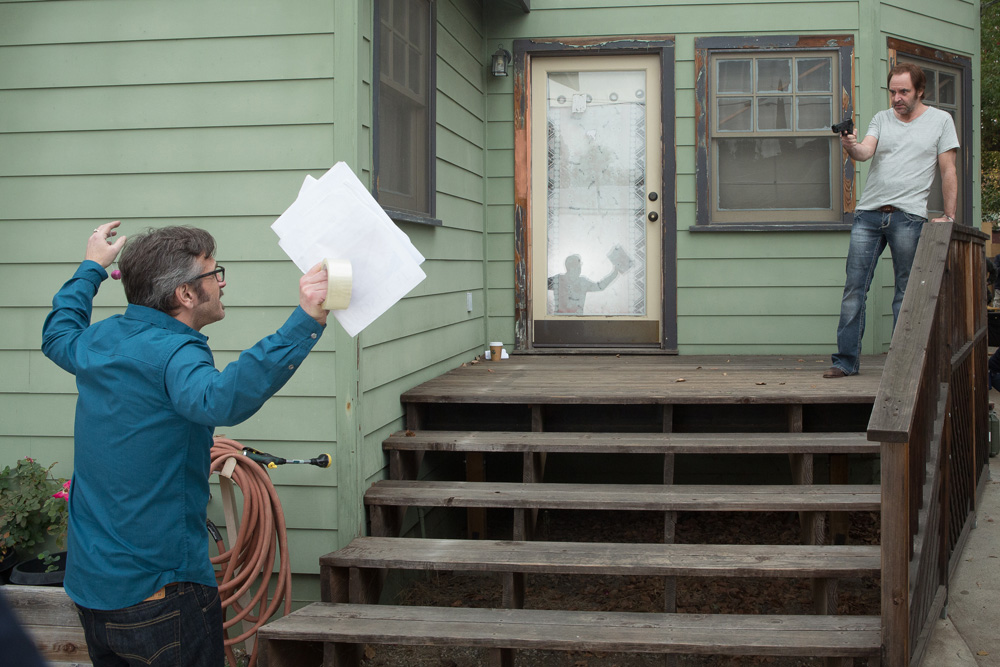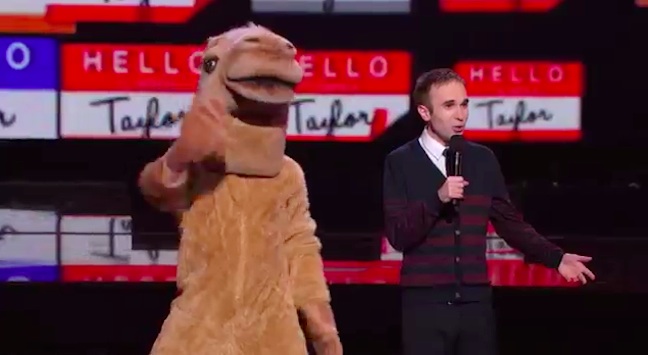You think you know…but you have no idea.
It’s the opening line celebrities uttered on the early 2000s MTV series, Diary.
It’s also just as true today, in 2014, for fans and followers of Marc Maron — despite all of the access we think we have to him and his nightly travails as a stand-up comedian, popular podcast broadcaster and star of his semi-autobiographical TV series on IFC, Maron, not to mention his thought process as shared to us via social media in Twitter bites and replies, or Facebook status updates and notes. Or even a Day (or Two) In The Life in Pictures of Marc Maron, as distributed to the World Wide Web yesterday via Vulture (and the current issue of New York magazine), published a few hours before I had him on the phone.
Even before talking to him, though, I’d noticed a line of his he’d uttered a month ago during his performance at the Moontower Comedy Festival in Austin, telling the audience: “Whatever bullshit you want to believe, you can find evidence to support it on the Internet.”
Having heard Maron talk about his falling-out with his father — in part an ongoing struggle to maintain a healthy father-son dynamic, in part very much exacerbated by the fictional version of Maron’s father portrayed by Judd Hirsch — followed by the dramatic reconciliation of father and son over the phone during the 500th episode of his WTF podcast. Having heard that on May 26, then having seen the Marons sitting side-by-side May 31 across the table from Jim Gaffigan and Tom Shillue on May 31, the thought of them breaking bread felt like the completion of a humorous harmonic circle.
Comfort food brings us all a little closer to home, doesn’t it?
“I had no idea they were in town!” Maron told me.
He said Jim Gaffigan and Tom Shillue had a couple of hours before they had to fly out of Albuquerque from one “Gaffigan gig” in New Mexico to another in Oklahoma. “A fan had told him to go to The Frontier,” Maron said. “Usually my first stop when I come in from the airport is The Frontier Restaurant.” Which he had just done so for his first face-to-face meeting with his father since the on-air reconciliation fans heard on WTF. “When I saw Jim, I said ‘What the fuck!’ But I was happy to see them. I had just spent 20 minutes in my car with my dad,” Maron said. “It was nice to have those guys around to buffer the situation and the conversation.”
And just to keep everyone in their places, someone approached Gaffigan at their table for a photograph without recognizing Maron or Shillue. A few minutes later, Maron said “someone wanted my photograph and didn’t seem to notice Jim. That balanced itself out. And then, poor Tom. He’s the guy who’s holding the camera.”
Thus keeping Shillue “Supernormal.”
Maron, meanwhile, continues to wonder how his audience is perceiving him, whether they’re ardent fans of everything he’s producing or mere strangers “dragged there” to see him for the first time. At some point or other during his current hour of stand-up, he’s likely to acknowledge as he did in Austin in late April: “I know that I’m not always funny but I’m usually compelling.”
But does he feel that way?
“I don’t know if it’s part of my sort of evolution or what, I always have a struggle with myself in terms of how much work I should be putting in the jokes or the act. I wrestle with acceptance that what I do is what I do. ‘I gotta tighten that up.’ ‘I need a better tag on that.’ Part of me has made that conversation public. I have a hard time deciphering what is my act and what is me. I think that might have been the goal.”
So he can be onstage, talking about turning contempt and empathy right back onto himself, only to find a woman in the front row of his audience wants to have a separate conversation with him about his act. Which sets him off. “I don’t even have to do the anger bit. I just did it!” Maron noted that night in Austin.
Today, he reflects: “I know I’m a good stand-up. I do it a certain way. I try to be in the moment as much as possible. And I don’t shy away from what conversation is going on onstage.”
Which can lead to a greater intimacy, or at least the perception of intimacy, now more than ever.
“It’s tricky because it’s very exciting for me to have people that want to come out and see me specifically,” he told me. “In some cities, a lot of people. That’s very comforting to me. They sort of know me fairly intimately. So I have to, in my mind, bring that relationship to the stage and continue the conversation that they’re familiar with, but elevate it to something public, because they’re all sitting there together. They’re not alone in their cars. My concern, and I usually rise to the occasion, is there are people who come to see me just knowing me from the TV show, or they were dragged there by a friend.”
In any given crowd, hundreds of people may come to see his stand-up expecting to see very specific yet different sides to Maron. Such is the life when you’re processing life for all (or as many as possible) to see on TV, online and wherever you listen to your podcasts.
As far as the TV version of Maron goes, he said there has been a natural growth and extension in his fictional self and that world onscreen from the first season to this second one. “In the first season, I had no experience acting. I had no experience writing TV. I had no experience producing TV. I knew I was ready to do all these things, but I can’t pretend I had experience. Fortunatately, I had a great crew around me…and I could become comfortable,” he said. This season: “I think what we were able to do is sort of look at the world we were writing for as a valuable backdrop to just tell stories that didn’t have to be exactly how they happened.”
“Whatever people say about me being transparent or my life being an open book: On any given day, my podcast monologue is 15 minutes, twice a week. So a half-hour. And the show is 22 minutes.
I live a full week! I have 24 hour days! So to think this captures my life or my day…”
Well, that’s obviously not telling his whole story.
So why not have more fun telling the TV story? Why not. “I had a little more control over my acting and more confidence in my writing and my writing staff, also my directors. I was a little more hands-on. But I was willing to take more risks this time. Emotionally I play them in a real way, but we take some creative license. We were more confidence in the world we created. And just in the process itself in storytelling. I think it’s interesting in the culture we live in that people think, ‘Oh, that must be real.’ When I was looking for Boomer, I don’t want to hurt anybody’s feelings, but I didn’t go to the house of a lunatic that was holding a gun. But why not give Rick Shapiro a gun? Who wouldn’t want to see that?”
Shapiro is one of many stand-up comedians playing either themselves or fictional characters who rotate in and out of Maron’s life. Chris Hardwick and Michael Ian Black played themselves in the second-season premiere. Caroline Rhea stars in an upcoming “nostalgic sex-buddy episode,” which is perhaps more amusingly nostalgic since she dated both Maron and his other co-star Dave Anthony a couple of decades ago.
Maron clearly enjoys carving out roles large and small for other comedians on his series. He elaborated in an earlier conversation with me:
Oh man, Andy Kindler and I have known each other forever, and it’s always good to work with him, and he’s in a couple of episodes. But Dave Anthony came on as a writer and performer, and I’ve known him for 20 years as well, and we have sort of a very specific dynamic. So that was amazing. It was great working with Dave, both as a writer and as a performer. Joey Diaz plays a character in a very important episode called “The Joke,” and he was brilliant. We wrote it for him, and I was glad that he was able to do it and do it so well because it’s a real comic-driven episode. In this season I did a little more of that. Like last season, I was little wary of integrating my stand-up life into the show, but this season I do a bit more of that. Tig plays a small part. She was great. Karen Kilgariff plays, like, a two-line part that was genius. Bill Burr plays himself, and he was Bill Burr; he was great. Ray Romano has a very big part in “Celebrity Friends,” and he plays a bit against type, and he was just brilliant. All the people that play themselves were great. Dave Cross plays himself but also is integrated into the story, and he’s just so natural and so funny. Jonah Ray plays a record store clerk, and it was really his first role, a big role in a piece, and he was great. I love working with comics. It makes me so happy and so grounded and so excited to do the scenes and stuff because I know these guys. We all come from the same place, and it’s very comforting to me. Everybody did a good job.
As for Shapiro’s appearance in this week’s episode of Maron, Maron said: “It was always going to be Rick. I’d known Rick a long time. It wasn’t like his life was easy before he got Parkinson’s. The amazing thing about Rick is he’s always going to be brutally present and a remarkable talent. It was a thrill just to work with him.”
Here is a behind-the-scenes clip of Maron explaining an episode from earlier this season:
Upon further reflection, Maron has done quite a bit of reflecting recently about how much he talks about his personal relationships in his professional life. That process continues.
He told me yesterday: “It took me a long time to learn a certain lesson. My last relationship, not my last one, but the one the character in the show is based on, when I was writing my book and I’d write about her and let her read it, she’d say ‘I don’t like this representation of me, and it’s only your perception and I can’t respond to it…it’s not fair and I can’t condone it.’ So it’s sort of tricky for that. You want to be respectful and capture my side of things. I want to make sure what I’m doing is not doomed by spite and there’s a reasonable balance to it. The component of my break-up and relationship with Jen on the show is based on it…I’m not making a movie and the character is going to be a bit more narrow than what happened, obviously. The events on the show were completely heightened and in some cases completely fictionalized.”
“But with my dad, it was the same thing. I believe I have the right to share my experience, but I have to be respectful. And I thought I was. But that doesn’t mean they’re not going to be offended or hurt. The repercussions of that were emotionally taxing. I’ll fly by the seat of my pants with my monologues, but I have to understand where I’m coming from and feel that it’s fair to some degree.”
I certainly can identify with Maron in that respect, living an online life and reporting one, too.
Can we pause and take that next right action, knowing even what that action might be when it comes to the spoken or written word?
I try to remind myself to pause before speaking and writing.
“Even if you take pause, you have to deal with self-righteous anger,” Maron replies. “The self-righteous anger, it’s hard to diminish, even if you take the pause. That’s where it becomes really tricky. You have to think ahead a few steps to go, this is true, and I feel this, but what are the repercussions going to be and will I still feel this in a month. And is it worth that? And am I willing to deal with this for the rest of my life?”
So how’s that working out for Maron?
“We’re also in a culture where depending upon how many Twitter followers you have…
He pauses. Twitter followings.
“Who are we really? And is this access really a genuine way to access anybody? You’re looking at an hour of me a week, extrapolated from a full life of experience and interactions and thoughts — because of access and everybody being out there, that’s what the culture wants to do. They want to lynch people with a semantic rope of 140 characters, that becomes a real challenge of how we judge in this age. For me, the healing with my dad and the thing with my exes. My dad and I have always had problems. I don’t know if we’ll ever quite get beyond what he thought was an injustice or betrayal. But we both want to be in each other’s lives.”
And if nothing else, he feels he’s now on the same emotional level of a playing field with his father. “And I think that was worth it.”
What comes next for Maron professionally is as much of a guess still as his personal prospects. His podcast success certainly has prompted more questions from the media about whether he could bring his WTF hosting to TV in some form or fashion.
“All I know is they’re (IFC) happy with the show,” Maron said. “Last week’s episode got higher ratings than any of the other Maron episodes. That’s all I know. They’re happy with the show. I don’t know anything else. That’s the truth.”
Does he like having his name mentioned as a late-night TV host? Certainly. “I’d be thrilled to be considered for the job. I’ve had conversations with IFC. I don’t know what they’re necessarily looking for in these shows, but I know in the past five years, I’ve done however many interviews – 480-something of them – that I do over and over again. Whether it’s showing up for a real conversation…emotionally compelling…the real big question is that even doable on television? I think it could be, and I’d like the opportunity to try it. Is that what they’re looking for?”
His pitch is so simple and pure I couldn’t help but giggle when he said it.
“I think for IFC, it’d be a more compelling argument, because I’m already there, so why not try it? Is airtime so precious? Why not try it? What’s the worst thing that can happen? At the end of the day, I could still go out to my garage and my podcast, and that’s going just fine.”
How far Maron has come in just the past five years.
***
Here’s a clip from tonight’s episode of Maron on IFC.
Maron in his own words. “I think it’s a very sweet episode. It was great to work with Rick (Shapiro). There’s a lot of pretty fun guest stars in that episode. I think Wyatt Cenac is the podcast guest. You know who’s in it? The dude Al Brown. He played Valcheck in The Wire. Cameron Esposito had a little part in it. Stephanie Allynne. Sean Patton and Kevin Christy.”
Maron airs new episodes Thursday nights on IFC. New episodes of WTF with Marc Maron upload twice a week, usually Mondays and Thursdays.



